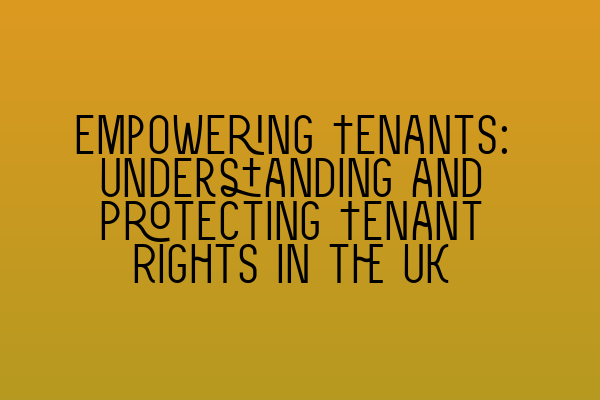Empowering Tenants: Understanding and Protecting Tenant Rights in the UK
Renting a property is a significant milestone for many individuals and families. Whether you are a student, young professional, or someone looking for a temporary living arrangement, it is essential to understand and protect your rights as a tenant in the UK. Knowing your rights can empower you to make informed decisions, navigate legal complexities, and ensure a safe and secure living environment.
At SQE Property Law & Land Law, we are committed to supporting tenants and educating them about their rights. In this blog post, we will explore the key rights and responsibilities of tenants in the UK, discuss common legal issues, and provide guidance on how to protect yourself as a tenant.
Tenancy Agreements and Deposits
When renting a property, it is crucial to have a written tenancy agreement in place. A tenancy agreement is a legally binding contract between the landlord and the tenant that outlines the terms and conditions of the tenancy. It covers important details such as the rent amount, payment due dates, length of the tenancy, and responsibilities of both parties.
In most cases, landlords require a security deposit from tenants as a form of protection against damages or unpaid rent. The deposit should be protected in a government-approved tenancy deposit scheme, and the landlord must provide the tenant with the prescribed information regarding the scheme within 30 days of receiving the deposit.
If you are unsure about the terms and conditions of your tenancy agreement or have concerns about your deposit, our team of expert solicitors at SQE Property Law & Land Law can provide valuable advice and assistance. Contact us today!
Rent and Rent Increases
The amount of rent and any rent increases should be clearly specified in the tenancy agreement. It is important to be aware of your rent obligations and ensure that you pay your rent on time. Failure to do so may lead to eviction proceedings.
If your landlord wants to increase the rent, they must follow specific procedures. In most cases, they are required to provide written notice of the rent increase at least one month before the proposed date. The notice should state the new rent amount, the date it will take effect, and the reasons for the increase.
Repairs and Maintenance
Landlords are responsible for ensuring that the property is safe, habitable, and in good repair. This includes maintaining the structure, plumbing, heating, and electrical systems. If you notice any repairs that need to be addressed, it is important to inform your landlord in writing and keep a record of your communication.
If your landlord fails to address necessary repairs, you may have the right to take legal action. However, it is advisable to seek legal advice before proceeding, as the process can be complex.
Notice and Eviction
If you wish to end your tenancy, you must provide notice to your landlord. The notice period depends on the type of tenancy agreement. For most assured shorthold tenancies, the notice period is two months.
On the other hand, landlords can only evict tenants under specific circumstances and must follow proper eviction procedures. Illegal evictions can result in severe penalties for the landlord. If you are facing eviction or believe that your landlord is acting unlawfully, it is important to consult a solicitor to understand your rights and options.
Tenancy Deposit Disputes
In some cases, disputes may arise between tenants and landlords regarding the return of the deposit at the end of the tenancy. If you believe that your deposit has been unfairly withheld, you have the right to dispute the decision through a tenancy deposit scheme’s dispute resolution process.
To strengthen your case, it is crucial to have proper documentation, including check-in and check-out inventories, photographs of the property’s condition, and any relevant correspondence with the landlord regarding repairs or damages.
For expert assistance in resolving tenancy deposit disputes or to understand more about the dispute resolution process, contact our team of experienced solicitors at SQE Property Law & Land Law today!
Legal Aid and Support
If you are facing legal issues as a tenant and require legal representation, you may be eligible for legal aid. Legal aid is financial assistance provided by the government to individuals who cannot afford legal representation.
Additionally, there are several organizations and charities in the UK that offer free legal advice and support to tenants. These organizations can provide guidance on tenant rights, help you understand your options, and assist you in asserting your rights as a tenant.
To find out more about legal aid or to seek support from tenant-focused organizations, visit our related articles: SQE 1 Practice Exam Questions, SQE 1 Practice Mocks FLK1 FLK2, SQE 2 Preparation Courses, SQE 1 Preparation Courses, SRA SQE Exam Dates. Our team at SQE Property Law & Land Law can also provide expert legal advice and representation. Contact us today!
Conclusion
Understanding and protecting your tenant rights is crucial for a positive and secure renting experience. By familiarizing yourself with your rights and responsibilities, seeking legal advice when needed, and being proactive in addressing any concerns, you can ensure a fair and equitable tenancy.
At SQE Property Law & Land Law, we are dedicated to empowering tenants and providing them with the legal guidance they need. If you have any questions or require legal assistance, do not hesitate to reach out to our team. Your rights as a tenant matter, and we are here to support you every step of the way.
